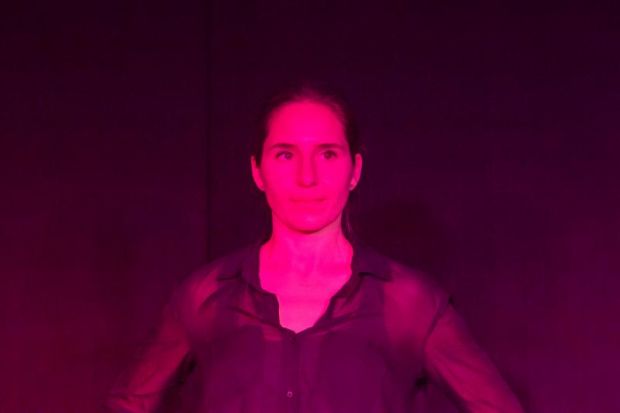Canary
Isabella Perversi tells her tale at breakneck speed - as if she (or her character) is in a constant state of incredulous amazement. ‘This can’t be happening… I can’t believe… ‘ She’s forever the fish out of water, uncertain, struggling to keep up.
Her tale is not an unfamiliar tale and it’s all in the energy of the telling. Perversi, tall and frenetic, dressed all in black, is alone on stage, her only props a stool and her very mobile face - which rapidly, so rapidly, expresses fleeting emotions of bewilderment, shock, rage, fear, contempt, anxiety, nausea, and dismay.
Her narrator is an ambitious but naïve girl from the suburbs who lands a job at a travel agency. She figures she has a future: she’ll work her way up to CEO. Why not? Of course, the agency has a CEO and owner - glamorous and inaccessible Michelle. So, it’s disturbing and discombobulating to be groped by Michelle’s slick and handsome son, Nick… Although… did he… ? Did that really…? Was it a hand cupping her bum? Or just a touch on her thigh? If the latter, well, that’s all right, isn’t it?

The other problem is sister Marni. Marni’s unemployed, an extrovert, maybe not that bright, and up for it. The two sisters still live together, out in the sticks, in their Mum’s old house. The back door’s always open ‘cause there’s nothing worth stealing… The real problem with Marni is Marni’s bogan boyfriend Byron…
Perversi’s writing is vivid: her observations are sharp, and she rapidly creates images so that we can see the sisters’ rundown house, a disco, the boss’s luxury home in Brighton (with all those weird artworks), the boss Michelle herself, the workplace, and its kitchenette (where the grope - or was it?) takes place.
If there are problems, they are, first, a certain lack of structure so that incident follows incident in a non-linear and rather haphazard fashion - and that Marni and the narrator’s fear for her completely take over the story.

Second, the rapid fire telling at times becomes too rapid - almost as if Perversi doesn’t trust her own material and so pushes too hard. Shifts in time, place or emotion are signalled by her turning to the left or right, moving that stool and fast (and clever) lighting changes. But these signals are not always on point - they can distract rather than focus. Is it too busy? Perversi herself is enormously engaging, but her narrative begins to feel all a bit too one note and relentless.
Michael Brindley
Photographer: Ben Andrews
Subscribe to our E-Newsletter, buy our latest print edition or find a Performing Arts book at Book Nook.

